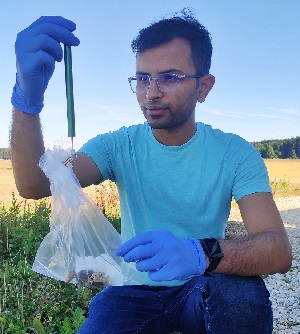Research interests
- Microbial ecology
- Microbiome
- OneHealth
- Microbes at extremes of life
- Microbial taxonomy and systematics

Scientific Projects
Microorganisms are known to play a vital role in maintaining the ecological balance by triggering biological and chemical turnover processes. The virtue of microbes to respond and adapt to changing environmental conditions describe their ubiquity in nature. Along this line, altered land use driving changes in the microbial community structure and composition may lead to augmentation of allochthonous microbial communities- with potential detrimental impacts on the environment, wildlife and human health, and its mitigation demands the consideration of the ‘One Health’ approach - recognizing the interconnection between human, animals, plants, and their shared environment (CDC).
Since 2022, I am a team member of the IMPALA project (‘Impact of agricultural land-use intensity on health functions of microbiomes along the trophic chain’, funded by the Baden-Württemberg-Stiftung, PI Prof. Dr. S. Sommer). I am investigating how different land-use practices in terms of fertilization affect the microbiome at different trophic levels with a primary focus on the transmission of antimicrobial resistance genes (ARGs). The metagenomic intervention followed by the mesocosm-based validation will enable us to trace the core and accessory microbiota and, also to follow the trail of transmission (and/or enrichment) of ARGs along the different tropic levels.
Publications
Jani K, Srivastava V, Sharma P, Vir A & Sharma A (2021). Easy access to antibiotics; Spread of antimicrobial resistance and implementation of one health approach in India. Journal of Epidemiology and Global Health, 1-9.
(https://doi.org/10.1007/s44197-021-00008-2)
Jani K, Bandal J, Shouche Y, Shafi S, Azhar EI, Zumla A, & Sharma A (2021). Extended ecological restoration of bacterial communities in the Godavari River during the COVID-19 lockdown period: a spatiotemporal meta-analysis. Microbial ecology, 82(2), 365-376.
(https://doi.org/10.1007/s00248-021-01781-0)
Jani K, Khare K, Senik S, Karodi P, Vemuluri VR, Bandal J & Sharma A (2018). Corynebacterium godavarianum sp. nov., isolated from the Godavari river, India. International Journal of Systematic and Evolutionary Microbiology, 68(1), 241-247.
(https://doi.org/10.1099/ijsem.0.002491)
Jani K, Dhotre D, Bandal J, Shouche Y, Suryavanshi M, Rale V & Sharma A (2018). World’s largest mass bathing event influences the bacterial communities of Godavari, a holy river of India. Microbial ecology, 76(3), 706-718.
(https://doi.org/10.1007/s00248-018-1169-1)
Contact
- Dr. Kunal Jani
- Institute of Evolutionary Ecology
and Conservation Genomics
University of Ulm
Albert-Einstein-Allee 11
89081 Ulm
Germany - Email: kunal.jani () uni-ulm.de
(https://twitter.com/kunaljaani)
(https://www.linkedin.com/in/kunaljaani)
(https://scholar.google.com/citations?user=3OkYLJ0AAAAJ)
